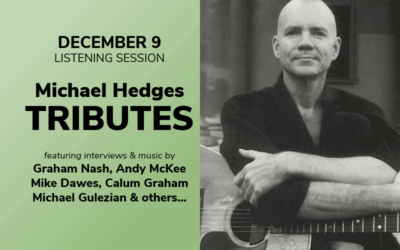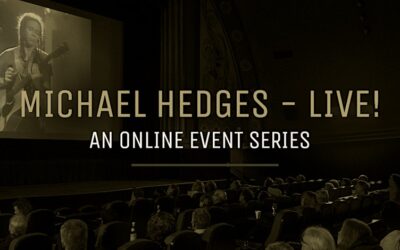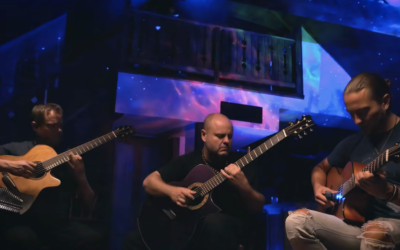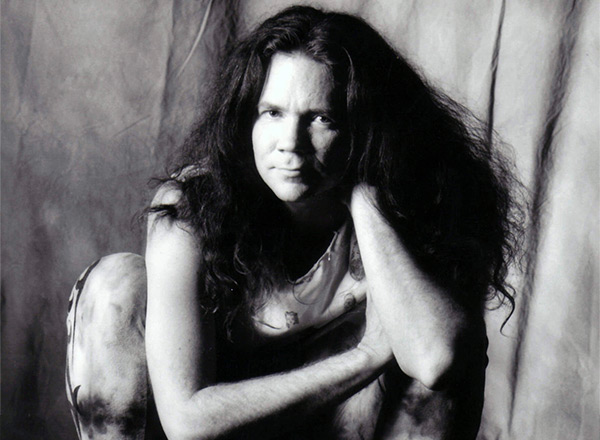From the original Nomadland.com website.
During the fall ’94 Road to Return tour, Brian Jarbo interviewed Michael for his radio program Guitar Works. The program can be heard in the Baltimore-DC area on 89.7 FM WTMD, Sundays 9-10PM. Thanks to Brian for the interview!
Interview with Michael Hedges on 10/29/94
I really love “Sister Soul”. The chord progression is simple…
It has moving inner lines though. You have three parts that go…[hums all three]. They’re all happenin’ at different times, but the guitar is always going “chunka chunka chunka chunka”. To me, that was the innovation—to hear three separate voices while the wrist is always going down-up down-up. You get a certain kind of groove going. That’s my style of guitar I called “wacka-wacka” about three or four years ago, where everything is down-up down-up. The first tune was “Ritual Dance”, then I wrote “Jitterboogie” (which isn’t recorded yet), and then “Dirge” which is a ballad wacka-wacka [also unrecorded at the time]. I don’t think that’s ever been done, at least I’ve not heard anything like it. So it’s all down-up down-up, but with moving inner lines.
One thing in particular I like about “Sister Soul” is the beginning where the lines build up before the vocals begin.
That adds meaning to the line, “It’s time to talk”, because there’s a long instrumental introduction which is just the melody. I also wanted to show off the fact that I’d written this wacka-wacka thing so I played it on two guitars and accentuated the melody by adding just a tiny bit of flute in the introduction, but yet it still seems like a guitar solo.
Have you found that merely playing guitar isn’t enough to express yourself musically anymore?
The tools are different. The more time I spend away from the guitar the more of a perspective I get on what the guitar is. I don’t think it can do anything but help my future writing on guitar. It’s just that I’m not really satisfied to only play guitar anymore. It doesn’t mean I’m moving away from the guitar or that I’ve changed my relationship with it.
I’ve always been passionate about the guitar and I think there’s no limit to what can be done on it. As long as I can truthfully say that, I see no reason why I couldn’t make another solo guitar record when I desire that texture. But maybe I could expand my guitar playing in a way that I never would have dreamt of unless I’d made something else.
Sometimes the best thing you can do for your guitar is to put it away for awhile. As long as you think, “I’ve got to do something new and different”, then that thought becomes an obstacle. I think the intent is to keep the channel open. The new and exciting stuff is just going to come out of your enthusiasm. But to empty the mind of thoughts—that’s a pretty tall order. It’s the object, but not the process. You can’t get to cosmic consciousness by thinking about cosmic consciousness [laughs]. You have to open up.
The idea I’m coming to now—my symbol—is a spiral, but at the end of the spiral there’s an arrow coming out at a right angle. Opposite that, say that end was south, there are also arrows at north, east, and west. You get the idea of coming out from the source—expansion. This is the idea I come to because of my yoga instruction. When you’re uptight or tense, when you’re contracting, then you’re unable to move your joints. It’s like somebody’s pulled in all your piano strings too tight and the top of your piano won’t move. It becomes stiff. When you loosen those wires, when you stretch all your tendons and muscles, then your joints and bones move away from each other. They expand so you get better range of motion. Then your internal strength, your life force, can flow through your joints with this expansion. That’s the purpose of accupressure or acupuncture—to free the blockages wherever they are.
There’s a lot of stuff involved in letting these things go. We don’t want to let them go because we’re comfortable with them. They have shielded us from our most severe emotional pain. The idea in yoga is to restore the flow of vital life energy. It’s called “Chi” in China, “Prana” in India, “The Force” in science fiction movies. Whatever. If you want to get it flowing you’ve got to get a good P.E. instructor. My P.E. instructor learned from a Chinese master in Taoist yoga, so I study something called “Chi Kung” which means energy exercises. The symbol I like, the spiral, is kind of my personal idea of that concept. [Pause] How’d we get off on that?! [Laughs]
Dunno, but it was cool. Are you finished with all of your instruction or is this is an ongoing process?
It’s always growing. That’s what my teacher calls it—“growing”.
You’ve said that the road to return is the act of looking inward. Was that what drew you to play all the instruments on the record, to make it more personal?
I always felt like, “Gee, I never got a chance to really work on my piano playing because of this guitar stuff.” The same for flute—I always played it for practicing melodies and writing little parts, but I’d always give it to somebody else to play or else I’d play it on guitar. I felt like I had all these dimensions that were just about ready to have my name stamped on them.
You develop your playing enough and practice enough to where you feel your personality is there somehow. I thought I’d rather have me in this than hire somebody else to come in and play a couple of takes. Maybe it works out fine—if it doesn’t, well, you’re out a couple of hundred bucks. I’d rather stay in practice and use that time, that energy, and even that money to develop myself rather than hire a bunch of good colors who are used to making the good colors. I’d rather make a little bit different shade of that color. Maybe it’s not quite as pure, but at least it’s mine. It doesn’t mean the music has to be personal, but I like to have control over that. It’s a control issue, sure.
Maybe now that I’m getting to know more and more and I’m able to communicate better I’ll be able to produce other people since I’ve already made a full production record. I talked to myself about it—“Is this good? Maybe it should be a bit different this way.” From those conversations I’ve started in myself, maybe now I can expand, grow further, loosen up that tendon and let that limb extend to another talent and use it. Maybe I can use someone else as an instrument and not have it be just what they want, but also what I suggest. This is a real great thing.
Mitchell Froom, the guy who produced Suzanne Vega’s last record, he’s a great producer. I love listening to what he does with other people like Richard Thompson. I called up his office a few times and got his address to send my demos to him, but then I thought, “Nah, I kinda want to do this myself. I know it’s a trap a lot of people fall into and some people shouldn’t produce themselves, but I’m not gonna buy it yet.”
What was the thinking behind putting “Follow Through” on the new record?
It’s a completely different version than the first one [on the Windham Hill in Concert video]. I had been saving that song for a future record and this was just the right time. I didn’t want to do it like I used to so I changed it all around and made a two guitar version of it, then added the drums and synth bass.
I noticed you did a few dates this tour with Leo Kottke.
Yeah! His new stuff is incredible, especially Great Big Boy. Although I like the latest one, Peculiaroso, there’s just something about Great Big Boy that kills me. Just incredible. We did a song off that. Leo sang,
“I was 29, and it absolutely stank.
Made a lot of friends, hung out at the bank.
Happy, contended, stuffed with dollar bills—
I stood out like a taxidermist’s elk up on a hill.”
I played flute and Mike Manring played bass while Leo played guitar and sang. He did four dates with us and we did a pretty good version. We also did a tune of mine called “Gospel” [from Oracle]. At the end of the gig we went into “Tomorrow Never Knows” by The Beatles. I’d sing, “Turn off your mind, relax and float downstream” and Leo would sing “It is not dying” in his low voice. It was just perfect. We had a wonderful time with Leo. Any time our paths cross we seem to have a good time together. I even got a chance to rehearse these tunes with him this time. I hung out at his place in Wayzata, near Minneapolis.
Do you plan to have Michael Manring record with you again soon?
Oh yeah. Michael’s a big part of the show I’m giving now. Since we’ll have all these new tunes under our fingers I’ll have to have him up to record.
The swing version of the Bach piece you’re doing is really great.
On the last tour we did it like Jethro Tull did, which was more bluesy, but then we got into the studio and I just felt like, “I don’t want to try and be Ian Anderson anymore…I just want to goof around with it and see where it goes.” I kind of have my own idea of how to play guitar. Why not do it on flute too? Why not play three guitar solos, then a flute piece, and then go back to guitar? Wouldn’t that be more interesting to listen to than five guitar solos in a row? I think so. That’s why I’m using these other instruments. Not just because I want to learn other instruments, but because it makes a more elegant frame for what I’m known for.
Do you ever get tired of playing “All Along the Watchtower”?
No. I wouldn’t do it otherwise. I let that song rest for two tours. I felt like I wasn’t speaking with it. It’s easy to tell. Once you get a feel for it you say, “Oh man, I’ve been playing that song so long. What a great friend that song has been. Hey, I’ll see ya later! No hard feelings man, but go away.” Then I did…I can’t remember what I was playing instead because I’ve been doing “Watchtower” again over a year now. Before then I think it was “You Can Have Anything You Want” off The Road to Return. I played that for two years. I don’t want to play that again for awhile because I busted my butt over it to get it on the record. You just want to let things rest.
What about “Gimme Shelter”?
That was what I did for an encore! No. I’m sick and tired of it. I’ve got a great live version of it recorded which we released in Latin America [from the Strings of Steel compilation]. We also released “Pinball Wizard” and “She Drives Me Crazy” on that. I peaked on them. There are so many other great songs. I want to do “Good Times, Bad Times” by Led Zeppelin. I think that would be a great cover. I also have a new guitar version of Frank Zappa’s “Sofa #1” which is good for an encore. I’m also writing a new song called “Death to Distraction” with his daughter Moon which will be on the Phoenix Fire record.
[Phoenix Fire was the working title of what was then a combination of what became Oracle (which also had the title Copperhead for awhile) and what is now becoming Torched. Confused yet?]
[Michael then finished the interview by playing an impromptu “Jitterboogie” on Brian’s guitar.]



